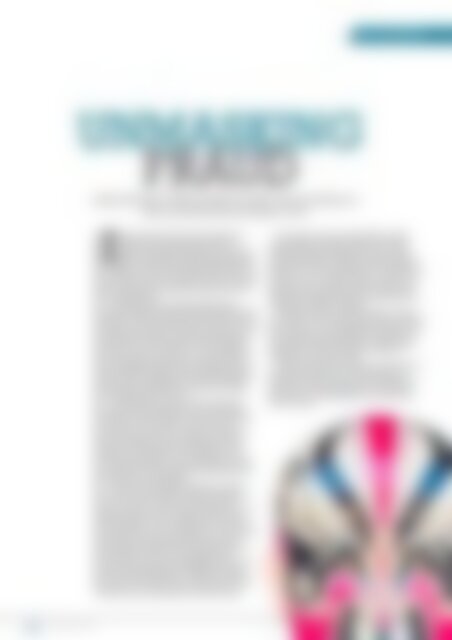Jan:Feb 2017 Credit Management magazine
THE CICM MAGAZINE FOR CONSUMER AND COMMERCIAL CREDIT PROFESSIONALS
THE CICM MAGAZINE FOR CONSUMER AND COMMERCIAL CREDIT PROFESSIONALS
Create successful ePaper yourself
Turn your PDF publications into a flip-book with our unique Google optimized e-Paper software.
ASK THE EXPERTS<br />
UNMASKING<br />
FRAUD<br />
David Thornley FCICM provides his expert view and advice on<br />
how to prevent fraud and cyber crime.<br />
IN the olden days, thieves wore masks; they<br />
assailed their victims using the threat of<br />
violence; perhaps they would force entry into<br />
property and make off with ill-gotten gains. But<br />
in doing so, they would invariably assume the risk<br />
of discovery, capture and imprisonment. There is no<br />
such thing as an honest thief, but at least back then,<br />
the threat was clear, identifiable and for the most<br />
part, preventable.<br />
Nowadays, however, thieves operate from<br />
behind a phalanx of technology which affords them<br />
distance and anonymity from their victims. For this<br />
reason, most of us assume that the thieves (let us not<br />
call them ‘fraudsters’, for thieves is what they are)<br />
will always be one step ahead, always sheltered,<br />
always out of reach. Moreover, a street mugger or<br />
a house burglar can perform no more than one or<br />
two attempted robberies on a given day, but the<br />
technology the modern cyber-thief utilises affords<br />
him or her the opportunity to launch potentially<br />
thousands of simultaneous attacks; most of which<br />
yield nothing but a few will.<br />
For these reasons, cyber-theft is particularly<br />
insidious and particularly scary. It seems that in<br />
every hour of every day our security, our finances,<br />
our peace of mind and our very way of life is<br />
under threat and we have neither the know-how<br />
nor the equipment to do anything about it. This<br />
threat of course extends to our places of work,<br />
which in turn impacts on our livelihoods, and as<br />
credit professionals, it surely falls within our remit<br />
to protect our companies from such attacks to the<br />
fullest extent of our abilities.<br />
This is not easy. Threats come from a variety<br />
of sources and in numerous guises. Recently, one<br />
of our overseas customers received an email,<br />
purporting to be from me, which asked him to pay<br />
his next remittance to a different bank account.<br />
The customer – who I have known for many years,<br />
and with whom I am on cordial terms – was uneasy<br />
about the tone and phrasing of the email and<br />
accordingly called me for confirmation. Disaster<br />
averted, but it sent alarm bells ringing and<br />
caused me to launch an investigation to see if any<br />
other customers had been emailed with similar<br />
instructions. Thankfully none had. The matter was<br />
reported to the bank and the authorities, but as I<br />
write, I have no information as to the outcome.<br />
The instance I have just described is a fairly<br />
crude attempt at eliciting a theft and one which<br />
sensible precautions should prevent, but other,<br />
less obvious threats are harder to detect. The lastminute<br />
instruction to change a delivery address for<br />
example; or a customer sending in a ‘new driver’ to<br />
collect an order; or indeed a large, out of the blue<br />
enquiry from a potential customer. All these may<br />
be harmless and quite valid, but equally may well<br />
represent an attempt to defraud.<br />
My advice when encountering these, or one of<br />
any number of other, scenarios would be to take the<br />
time to check it out as thoroughly as possible, using<br />
every resource at your disposal. Be cautious, but<br />
not paranoid and insist that your company installs<br />
procedures to allow the breadth and scope to<br />
conduct the necessary checks.<br />
Finally, I urge you all to ‘skill up’; talk to experts<br />
on prevention, the police, or the banks. Read<br />
articles, take advice and increase awareness. The<br />
thief may be one step ahead, but it is incumbent<br />
upon all of us in the profession to do all we can to<br />
narrow the gap.<br />
The recognised standard<br />
www.cicm.com <strong>Jan</strong>uary / <strong>Feb</strong>ruary <strong>2017</strong> 19


















